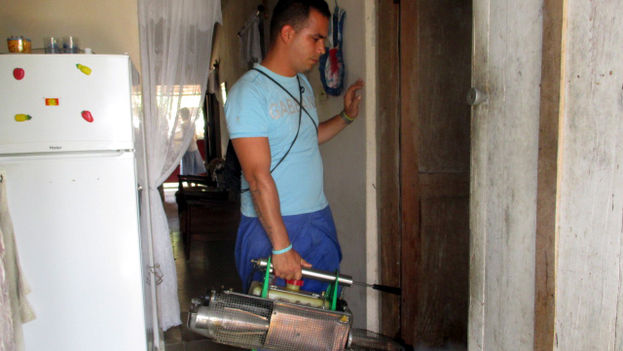
![]() 14ymedio, Fernando Donate Ochoa, Holguin, 15 June 2015 — An undesirable presence has been constant these days in the province of Holguin. A severe drought has been followed by the longed-for rains and with the torrential downpours outbreaks of the mosquito Aedes aegypti increase. According to local press, some 30,000 Holguinn residents are exposed to Dengue Fever, transmitted by this insect.
14ymedio, Fernando Donate Ochoa, Holguin, 15 June 2015 — An undesirable presence has been constant these days in the province of Holguin. A severe drought has been followed by the longed-for rains and with the torrential downpours outbreaks of the mosquito Aedes aegypti increase. According to local press, some 30,000 Holguinn residents are exposed to Dengue Fever, transmitted by this insect.
In this battle the local government has invested over 1.5 billion pesos, without obtaining the expected results, as shown by the data provided by the Department of Hygiene and Epidemiology. Officials say that the vector has crossed the boundaries of 26 de Julio, Pueblo Nuevo, Hilda Torres and Harlem neighborhoods, and arrived in Libertad, Alcides Pino, Palomo, Nuevo Llano and Centro Ciudad Norte, where a wide perimeter takes in the area between Frexes, Carretera to Gibara Streets, Capitan Urbino Avenue and 31st of Vista Alegre, with the appearance of Dengue Fever in all of them.
It is predicted that in June and July, months that favor the undesirable vector because of the climate and the rain, transmission could trigger an epidemic of patients appearing with Hemorrhagic Dengue Fever. The complicated situation has forced the health authorities to intensify the work of control, but there continues to be a deficit of 300 operators to support fumigation inside homes and other places.
Given the seriousness of the situation, the Municipal Health leadership has asked different state institutions for a workforce, but the answer has not been as expected.
It is predicted that in June and July the climate and rain could trigger the onset of patients with Hemorrhagic Dengue Fever
Yendri Bermúdez Estupiñán, a former operative of the anti-vector campaign, told 14ymedio that the work is every day, working more than 8 hours, most of the time carrying fumigation equipment weighing 65 pounds, and exposed to poisons through working with the cypermethrin, a chemical used to control mosquitoes.
He also complains that the lunch, guaranteed daily, is small and of low quality. The salary of 625 Cuban pesos a month (about $25 US), isn’t enough to maintain a stable workforce in the sector.
As a last resort, the municipal authorities have asked for help from the Revolutionary Armed Forces, which mobilized a weekly rotation of more than one hundred soldiers, according to what Julio Cesar Velazquez Garcia, head of the Provincial Health Vector Control Department, told local TV.
